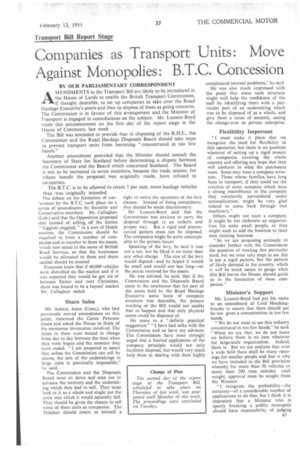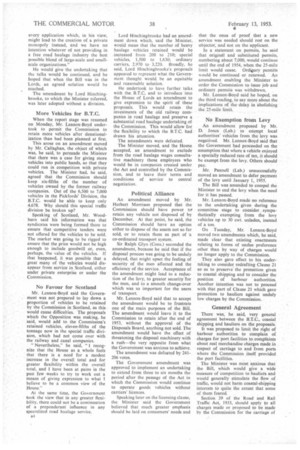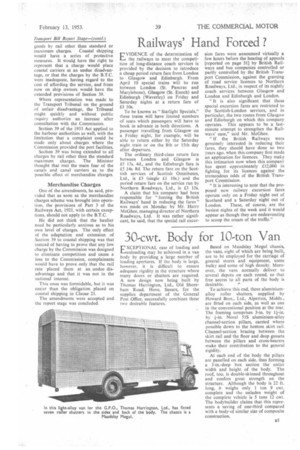Transport Bill Report Stage
Page 37

Page 38

Page 39

If you've noticed an error in this article please click here to report it so we can fix it.
Companies as Transport Units: Move Against Monopolies: B.T.C. Concession
BY OUR PARLIAMENTARY CORRESPONDENT
AMENDMENTS to the Transport Bill are likely to be introduced in the House of Lords to enable the British Transport Commission, if thought desirable, to set up companies to take over the Road Haulage ExecutiVe's assets and then to dispose of them as going concerns. The Commission is in favour of this arrangement and the Minister of Transport is engaged in consultations on the subject. Mr. Lennox-Boyd made this announcement on ,the first day of the report stage in the House of Commons, last week.
The Bill was amended to provide that in disposing of the R.H.E., the Commission and the Road Haulage Disposals Board should take steps to prevent transport units from becoming "concentrated in too few hands."
Another amendment provided that the Minister should consult the Secretary of State for Scotland before determining a dispute between the Commission and the Board which concerned Scotland. The Board
is not to be increased to seven members, because the trade unions, for whose benefit the proposal was originally made, have refused to co-operate.
The debate on the formation of conferences by the B.T.C. took place on a series of amendments by Socialist and Conservative members. Mr. Callaghan (Lab.) said that the Opposition proposed that instead of selling off the lorries " higgledy-piggledy " in a sort of Dutch auction, the Commission should be required to form a number of companies and to transfer to them the assets, which now stood in the name of British Road Services, so that the businesses mould be allocated to them and share capital should be created.
Everyone knew that if 40,000 vehicles were shovelled on the market and if it was expected they would be got rid of between Easter and next Christmas, there was bound to be a buyers' market Mr. Callaghan stated.
Share Sales Mr. Aubrey Jones (Cons.), who had previously moved amendments on this point, instanced the Carter Paterson assets and asked the House to think of the enormous inventories involved. The items in them were bound to change from day to day between the time when they were begun and the moment they were ended. "I am prepared to assert that unless the Commission can sell by shares, the sale of the undertakings in large units is practically impossible," he said.
The Commission and the Disposals Board must sit down and map out in advance the territory and the undertaking which they had to sell. They must look at it as a whole and single out the units into which it would naturally fall. They should be given the chance to sell some of these units as companies. The Minister should retain to himself a
right to waive the operation of the levy clauses. Instead of being compulsory, they should be made discretionary.
Mr. Lennox-Boyd said that the Government was anxious to carry the disposal through in an orderly and proper way. But a rigid and preconceived pattern must not be imposed. The companies might be quite unacceptable to the private buyer.
Speaking of the levy, he said it was not a tax, but he liked it no more than any other charge. The size of the levy would depend—and he hoped it would be small and would not last long—on the prices received for the assets.
He was advised, he said, that if the Commission and the Disposals Board came to the conclusion that for part of the assets held by the Road Haulage Executive some form of company structure was desirable, the present wording of the Bill would not enable that to happen and that only physical assets could be disposed of.
He came to a "definite practical suggestion." "I have had talks with the
Commission and so have my advisers.
The Commission have most strongly urged that a limited application of the company principle would not only facilitate disposal, but would very much help them in dealing with their highly complicated internal problems," he said.
He was also much impressed with the point that some such structure might well help the confidence of the staff by identifying them with a particular part of an undertaking which was to be disposed of as a whole, and give them a sense of security, easing the change-over to private enterprise.
Flexibility Important
"I must make it plain that we recognize the need for flexibility in this operation, but there is no question whatever of setting up a rigid mosaic of companies covering the whole country and offering any hope that they will conform to what the purchasers want. Some may want a company structure. Those whose families have long been in transport, if they could see the creation of some company which bore a strong resemblance to the company they reluctantly surrendered under nationalization, might be very glad indeed to come back through that machinery."
Others might not want a company. It might be too elaborate an organization for some small people, or they might want to add the business to their own existing business.
"So we are proposing seriously to consider further with the Commission the question of meeting this particular need, but we must take steps to see this is not a rigid pattern, but the pattern of likely demand in the country, which it will be much easier to gauge when this Bill leaves the House, should guide us in the formation of these companies."
Minister's Support Mr. Lennox-Boyd had put his name to an amendment of Lord Hinchingbrooke to ensure that there should not be too great a concentration in too few hands.
"We do not want to see this industry concentrated in too few hands," he said. "When we say that, we do not mean we believe there is no case whatever for large-scale organization. Indeed, there is. But we are anxious that over a wide field there shall be many openings for smaller people and that is why we have included in the Bill provision whereby for more than 50 vehicles or more than 200 tons unladen total weight, approval must be sought from the Minister.
"I recognize the probability—the certainty—of a considerable number of applications to do that, but I think it is important that a Minister who is openly breaking a public monopoly should have responsibility of judging B3 every application which, in his view, might lead to the creation of a private monopoly instead, and we have no intention whatever of not providing in a free road haulage industry the best possible blend of large-scale and smallscale organizations."
He would give the undertaking that the talks would be continued, and he hoped that when the Bill was in the Lords, an agreed solution would be reached.
The amendment by Lord Hinchingbrooke, to which the Minister referred, was later adopted without a division.
More Vehicles for B.T.C.
When the report stage was resumed on Monday, Mr. Lennox-Boyd undertook to permit the Commission to retain more vehicles after denationalization than had been planned at first.
This arose on an amendment moved by Mr. Callaghan, the object of which was, he said, to persuade the Minister that there was a case for giving more vehicles into public hands, so that they could run in competition with private vehicles. The Minister had, he said, agreed that the Commission should keep six-fifths of the number of vehicles owned by the former railway companies. Out of the 6,500 to 7,000 vehicles in the Pickfords' Division, the B.T.C. would be able to keep only 4.678. Why should this special traffic division be broken up?
Speaking of Scotland, Mr. Woodburn said his information was that syndicates were being formed there to ensure that competitive tenders were not offered for the vehicles to be sold. The market was going to be rigged to ensure that the price would not be high enough to include goodwill or, even, perhaps, the value of the vehicles. If that happened, it was possible that a great many of the vehicles would disappear from service in Scotland, either under private enterprise or under the Commission.
No Favour for Scotland Mr. Lennox-Boyd said the Government was not prepared to lay down a proportion of vehicles to be retained by the Commission in Scotland, as this would cause difficulties. The proposals which the Opposition was making, he said, would add to the Commission's retained vehicles, eleven-fifths of the tonnage now in the special traffic division, which had not come over with the railway and canal companies.
" Nevertheless," he said, "1 recognize that the House as a whole feels that there is a need for a modest increase in the overall total and for greater flexibility within the overall total, and I have been at pains in the past few weeks to try to work out a means of giving expression to what I believe to be a common view of the House."
At the same time, the Government took the view that in any greater flexibility, there could not be a continuation of a preponderant influence in any specialized road haulage service.
64 Lord Hinchingbrooke had an amendment down which, said the Minister, would mean that the number of heavy haulage vehicles retained would be increased from 200 to 210; special vehicles, 1,500 to 1,630; ordinary carriers, 2.970 to 3,220. Broadly, he said, Lord Hinchingbrooke's proposals appeared to represent what the Government thought would, be an equitable and reasonable solution.
He undertook to have furiher talks with the. B.T.C. and to introduce into the House of Lords an amendment to give expression to the spirit of these proposals. This would retain the investments of the old railway companies in road haulage and preserve a substantial road haulage undertaking of the Commission. This would allow for the flexibility to which the B.T.C. had drawn his attention.
The amendments were defeated.
The Minister moved, and the House accepted, an amendment to exclude from the road haulage wages consultative machinery those employees who would be in companies created under the Act and controlled by the Commission, and to leave their terms and conditions of service to central negotiation.
Political Alliance An amendment moved by Mr. Herbert Morrison proposed that the Commission should have power t retain any vehicle not disposed of by December. At that point, he said, the Commission should have an option either to dispose of the assets not so far sold, or to retain them as part of ea co-ordinated transport system.
Sir Ralph Glyn (Cons.) seconded the amendment, because he said that if the disposal process was going to be unduly delayed, that might upset the feeling of security of the men affected and the efficiency of the service. Acceptance of the amendment might lead to a reduction of the levy, to greater security for the men, and to a smooth change-over which was so impprtant for the users of transport.
Mr. Lennox-Boyd said that to accept the amendment would be to frustrate one of the main purposes of the Bill. The amendment would leave it to the Commission to retain after the end of 1953, without the approval of the Disposals Board, anything not sold. The amendment would have the effect of threatening the disposal machinery with a rush—the very opposite from what the Government was anxious to achieve.
The amendment was defeated by 241206 votes.
The Government amendment was approved to implement an undertaking to extend from three to six months the period after the passage of the Act in which the Commission would continue to operate goods vehicles without carriers' licences.
Speaking later on the licensing clause, the Minister said the Government believed that much greater emphasis should be laid on consumers' needs and that the onus of proof that a new service was needed should rest on the objector, and not on the applicant.
In a statement on permits, he said that original and substituted permits, numbering about 7,000, would continue until the end of 1954, when the 25-mile limit would cease. Ordigary permits would be continued or renewed. An amendment enabling the Minister to order the Commission to issue job and ordinary permits was withdrawn.
Mr. Lennox-Boyd said he hoped, on the third reading, to say more about the implications of the-delay in abolishing the 25-mile limit.
No Exemption from Levy
An amendment proposed by Mr. D. Jones (Lab.) to exempt local authorities' vehicles from the levy was negatived. Mr. Lennox-Boyd said that the Government had proceeded on the assumption that where a vehicle enjoyed a specially reduced rate of tax, it should be exempt from the levy. Others should pay.
Mr. Pannell (Lab.) unsuccessfully moved an amendment to defer payment of the levy until January 1, 1955.
The Bill was amended to compel the Minister to end the levy when the need for it has passed.
Mr. Lennox-Boyd made no reference to the undertaking given during the committee stage to consider sympathetically exempting from the levy vehicles up to 30 cwt. unladen, instead of a ton.
On Tuesday, Mr. Lennox-Boyd moved two amendments which, he said, made clear that existing enactments relating to forms of undue preference other than by way of charges would no longer apply to the Commission.
They also gave effect to his undertaking to consider redrafting Clause 21 so as to preserve the protection given to coastal shipping and to consider the position of harbour authorities. Another intention was not to proceed with that part of Clause 21 which gave protection to hauliers against unduly low charges by the Commission.
General Agreement
There was, he said, very general agreement between the B.T.C., coastal shipping and hauliers on the proposals.
It was proposed to limit the right of harbour authorities to complain of charges for port facilities to complaints about real merchandise charges made in respect of carriage to and from ports where the Commission itself provided the port facilities.
The Minister was most anxious that the Bill, which would give a wide measure of competition to hauliers and would generally stimulate the flow of traffic, would not harm coastal-shipping interests to quite the extent that some of them feared.
Section 39 of the Road and Rail Traffic Act, 1933, should apply to all charges made or proposed to be made by the Commission for the carriage of
Transport Bill Report Stage—(contd.}
goods by rail other than standard or maximum charges. Coastal shipping would have a series of protective measures. It would have the right to represent that a charge would place coastal carriers at an undue disadvantage, or that the charges by the B.T.C. were inadequate, having regard to the cost of affording the service, and from now on ship owners wouldhave the extended provisions of Section 39.
Where representation was made to the Transport Tribunal on the ground of unfair disadvantage, the Tribunal might quickly and without public inquiry authorize an increase after consultation with the Commission.
Section 39 of the 1933 Act applied to the harbour authorities as well, with the limitation that a complaint could be made only about charges where the Commission provided the port facilities.
Section 39 was being extended to all charges by rail other than the standard maximum charges. The Minister thought that met the main fear of the canals and canal carriers as to the possible effect of merchandise charges.
Merchandise Charges One of the amendments, he said, provided that as soon as the merchandise charges scheme was brought into operation, the provisions of Part 3 of the Railways Act, 1921, with certain exceptions, should not apply to the B.T.C.
He did not think that the haulier need be particularly anxious as to his own level of charges. The only effect of the adaptation and extension of Section 39 to coastal shipping was that instead of having to prove that any low charge by the Commission was designed to eliminate competition and cause a loss to the Commission, complainants would have to prove only that the rail rate placed them at an undue disadvantage and that it was not in the national interest.
This onus was formidable, but it was easier than the obligation placed on coastal shipping in Clause 21, The amendments were accepted and the report stage was concluded.




















































































